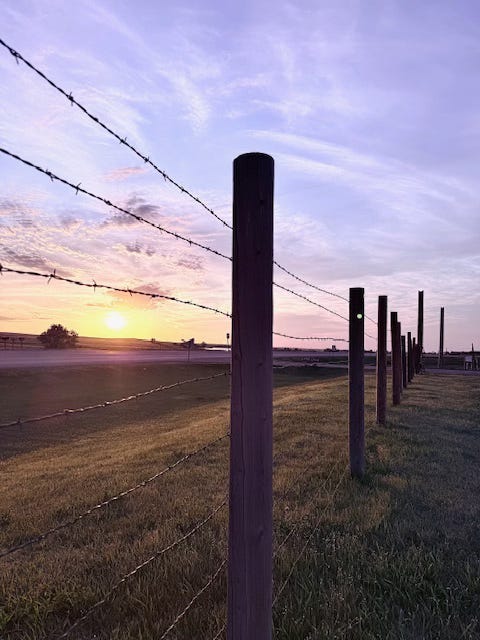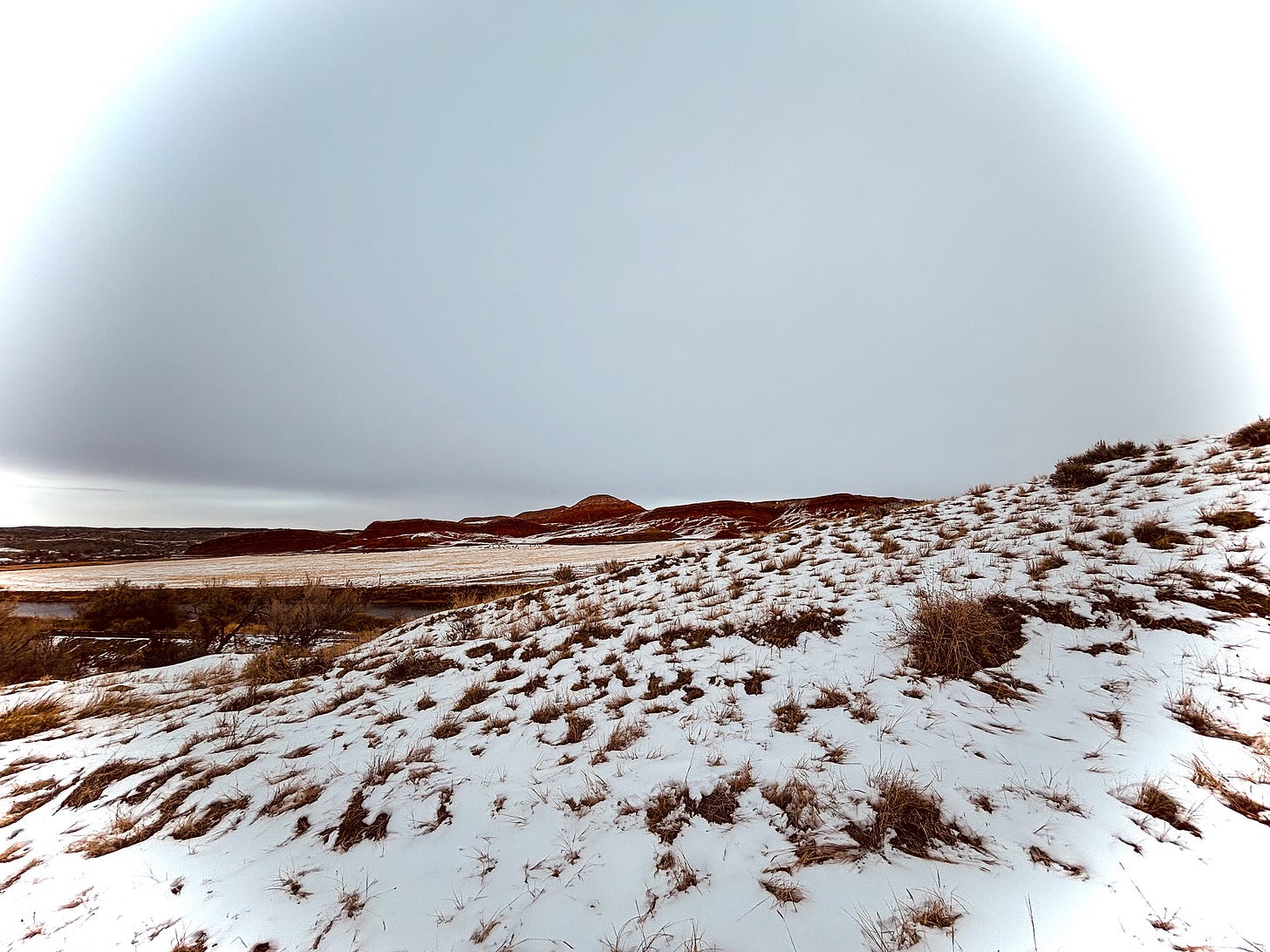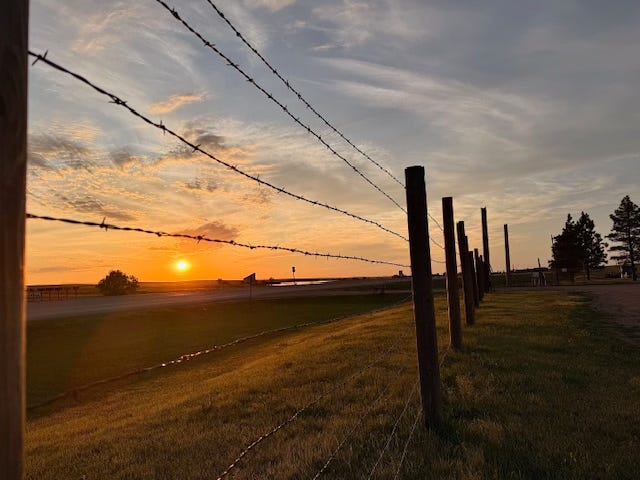Here’s a one-take reading of this week’s postcard recorded (with help from Luna) in the parking lot of a truck stop in - Nevada, I think. -xo
It's 100 degrees in Midland, Wyoming.
The heat grabs your face when you roll down the window like some drunk uncle that wants to squish your cheeks and say You got some freckles there, champ.
It's four, five o'clock on the second day of a long run west. You pulled in with your tank just this side of empty, parked at the perimeter, and walked the dog, checking the weeds and scrub for snakes as you went. The lot where you're idling is a big wide swath of dust, a couple diesel pumps, a store well on its way to tipping clean over with an observable slant to its roof. The trucks that take this route are bigger than those you'd see on the interstate, and the road shows the wear - all bumps and cracks, nearly took out your shocks.
There are no houses, no trailers, no buildings, for miles. Way out ahead in the distance, you saw a scattered handful of what looked like pale pebbles and rocks; peering as you neared, they turned into trailers and sheds. You passed the sign for the town: population 145. You were on the phone with a friend; a few miles back, you'd said I found it, man. This is the worst road in America. This is it.
What road was it? You cut across the state on the diagonal, northeast to southwest, turning off 90 just after the Badlands in South Dakota, making your way down and over to pick up 80 outside of Rock Springs. A day later, you can't even recall.
You slowed in the town of 145, looking for a gas station, but a long-abandoned pump outside a building wide-eyed with broken windows was all you saw. A few miles later, you came upon Midland, population 251, all of which citizens appear to drive white pickups and unmarked long-hauls, all of which vehicles are parked in the lot where you're idling, wasting gas at $5.91 a gallon - captive market - watching the scrub and weeds for snakes.
You check the temp in Midland, Wyoming: 100 degrees.
You check the temp in Midland, Texas: 100 degrees.
Yesterday you passed a sign that marked the middle of the country.
There was something you wanted to say about that - it seemed pertinent, salient, somehow - but you rolled down the window, rattling down the worst road in America, and the hot wind reached in and snatched it right out of your mouth.
I was talking with someone the other day about my sense that actions that once were - or seemed -
purposeful, meaningful, no longer carry the weight they once did. I was saying that the actions we were once able to take as citizens of places, of towns and cities and states and nations, of this nation especially, may still be available to us, but they are no longer always actions with impact. They are gestures, I said. That doesn't render them worthless; that doesn't mean that what they are intended to express isn't important. It means their value inheres in what they do for the individual.
As such, they have value, of course - actions of protest, expressions of dissent. But value is distinct from impact. They have value largely as mechanisms of reassurance: We the people still exist. We the people hold at least some few common beliefs. We the people believe in the greater good. We the people take comfort in the shared belief that we are on the right side of history.
We the people fret and shake our heads and wring our hands.
Does that have value? I asked. Sure. For us. Does it have impact? I shrugged.
And you? this person said to me. Where do you see yourself in this framework? Do you see what you're doing as having value, or impact?
I laughed. Neither, I said. I'm just trying to make it to the end of this life alive.
And while that's true - I am doing what I know how to do, what I can afford to do, what I have no better option than to do, no better idea of what could be done with what I have - I believe, even if only because I have to believe it, that the stories of people who do not make the news, the stories of places that will never make the map, where people live lives that will go uncelebrated, unrecorded, unremarked, where days come and days go and people do what they can to make it to the end of this life alive, have value.
And if telling them has no impact, that is less a reflection of these people, these places, their stories, than it is a reflection of the failure of a nation to know where value lies.
Farmland to the South Dakota Badlands,
Badlands into the Black Hills. As you drive, you leave a message for a friend, say that compared to the showy beauty of California, the Black Hills have a more subtle beauty, less flagrant: the steady, rolling beauty of grasslands, the hills covered with shadows cast by forests of black pine.
West on 90; cut south at Devil's Tower. Get off the interstate, onto state highways, then county roads. Driving west is easy - just follow the sun. As day fades, chase the lingering source of light. Once it's night, you can still orient yourself - out here, at least, hundreds of miles from cities and towns - by the sky: the low-hanging moon, the chart of stars. You sail down the narrow ribbon of road, raising a hand in greeting to the huge trucks that pass - entire buildings on flatbeds, double-stacked racks of enough equipment to work a sizable farm, four tanks of diesel strung together on rigs that can't be legal - chasing a storm that gathers itself into folds and fistfuls of clouds across the sky above Wyoming's vast open swath of earth.
A friend of yours bought some land in Wyoming - hundreds of acres for less than a thousand dollars apiece. It's breathtaking even in winter: red rock hills breaking the far horizon, snow hissing over broad swaths of dun-colored stone. You walked a ways down a dry wash that formed a path overhung with sandstone cliffs, sere branches, dry trees, to try out some guns. You can see so far out there you don't risk hitting anyone, anything. In each long echoing reverb, you found yourself staring into the distance, seeing how far you could see.
Endless space.
Wyoming is the most sparsely populated state in the nation.
One of the critiques of the electoral college is that a vote in Wyoming carries more weight than a vote in California; a single citizen's vote counts for more in a state with more land, and thus more electoral power, than people.
Driving through, you wonder how many people who've lately named their children Dakota or Cheyanne have ever seen the Dakotas or been within spitting distance of Cheyanne.
You wonder how many of the people in New York and L.A. who still refer to the middle of the nation as "flyover country" were born into the poverty and collapsed industry and lack of mobility and scarcity of education and paucity of options, absent both routes out of town and without the means to travel them even if they did exist. You wonder if they're aware that those things shape every aspect of life in flyover country, or that their own ignorance of what America is like outside their own silo is causal, not incidental, in the creation of a deepening chasm that runs down the middle of the country, or that the divide is not between east and west or left and right so much as it is between rich and poor.
By the time you approach Muddy Gap, your tank is nearing empty again. You swerve sharply left, jolt up a badly rutted drive to the only station for another 60 miles. You struggle to get out of the truck - the wind's high and rising, pushing back when you try to push open the door - and stand with feet planted, buffeted by wind, trying to open the tank without blowing away.
The pump won't take your card.
You try another card - no luck.
You try Apple Pay - the screen says you have to pay inside. You swear, march toward the store's door, yank the handle, swear some more.
The store is closed.
You look back at the truck, the gas pump, the rutted road, the endless rolling hills rich with oil, the incoming clouds, the darkening sky.
You drive west, young man, on the worst road in America, cutting through a vast, empty landscape, watching a storm brew on the horizon to the north. The oil rigs’ skeletal frames are etched, sharp and black, against a red-washed sky. The cloudbank is purple; a few hundred miles off, you can just make out the shift and stir of columns of purple rain.
The first crackle of lighting is soundless, jagged and sudden, flashing like strobe across your windshield, illuminating the mountains to the south.
People ask me sometimes why I use the second person now and then,
- why I tell a story that way sometimes, with you, instead of I.
Because it's all the same story. It's all the same traveler, same road. Because it's never just my story. It's never just me.
It’s the woman walking into the bathroom as I'm walking out, her face flushed - maybe the AC in her car is busted, maybe it never worked.
It's the guy who steps aside when I come around the corner, does the dance of letting me pass, his hair matted in front from the hat he's holding in his hand.
It's the girl at the front counter, long hair dyed black, digging through her bag, asking everybody if they've seen the two packs of cigarettes she just bought.
Where'd she drive in from? How far does she have to commute to work? Did somebody drop her? Who? Where does she live? There's nothing near here. Is this her future? Is this her whole life? Do you know the feeling of being at the start of your shift and reaching into your bag and finding out the two packs of cigarettes you bought on purpose to get through the ride to work, through the endless hot night with one break, maybe two, breaks you were going to spend sucking down tar, getting the chemical hit to the brain that gives you an instant relief, reprieve, of what passes for joy, and realizing you left them, or lost them, or some fucker reached into your bag and stole the only pleasure you have?
It's her, and it's her boss slinging pallets of beer in the cooler, and it's every trucker in the lot with his hood up, crawling into the belly of the ticking beast to tinker with the fuel line that's overheated, to reach one leather-gloved hand in carefully, trying not to burn his sunburned skin on the burning engine or singe the hair on his arms, thinking Don't blow, don't blow, don't blow.
It's the guy slinging hash behind the counter in the far corner of the store, squinting against the smoke and spatter off the grill, the corners of his eyes pinched behind his greasy visor.
Do you know how long it takes to get the smell of fried out of your hair when you get home? Out of your hair, out of your clothes, to wash the smell of old grease off your hands?
Trick question. You can't. Never. Not ever. You can't.
It's the little boy waiting in line at the counter, holding his dollar bills in both hands like he's holding a neat frog he found, his face lifted, waiting to talk to the guy at the grill, waiting for what probably feels like forever, waiting for whoever, whatever grownup has put him in line and told him to stay put while they ran to the bathroom, waiting to get back in the backseat of whatever car, waiting to sit and watch the endless hills and vast open space of Wyoming fly by the window at 90 mph, waiting to get wherever they're going, waiting and waiting, he's so patient it nearly kills me to watch him, his little fists holding onto their dollar bills, the cowlick in his sweaty hair, his blue shirt with the smudge, his face lifted, eyes searching the menu board on the counter next to the whiteboard sign that in another place and time might list the specials but now says in all caps dry-erase blue, AMMO - BUY TWO BOXES FOR $20 GET ONE FREE!!!, this kid is still waiting to talk to the guy bent over the grill, barely visible behind his greasy visor, his visor barely visible behind a neatly stacked tower of boxes of exploding shells.
It’s them, and it's me, and there is no right side of history, there is no we the people, and it could just as easily be you.











"It’s them, and it's me, and there is no right side of history, there is no we the people, and it could just as easily be you." The connection, the witness -- this has value and impact. This is what we can do as writers. And it may be so little, but that's not "that is less a reflection of these people, these places, their stories, than it is a reflection of the failure of a nation to know where value lies." Thank you.
Good god, Marya, this whole thing was amazing but that last section- your descriptions of all the people- I want to compare it to the build up before an orgasm but I really don't know how that will go over here so I'm just going to pull from my weirdly specific life experience instead and say it was like waiting for a whale to surface. The focus, the anticipation, th scanning and searching and then BAM that last sentence was the spout. I want to point at it and announce, 'There it is!" Which is to say, I got chills.